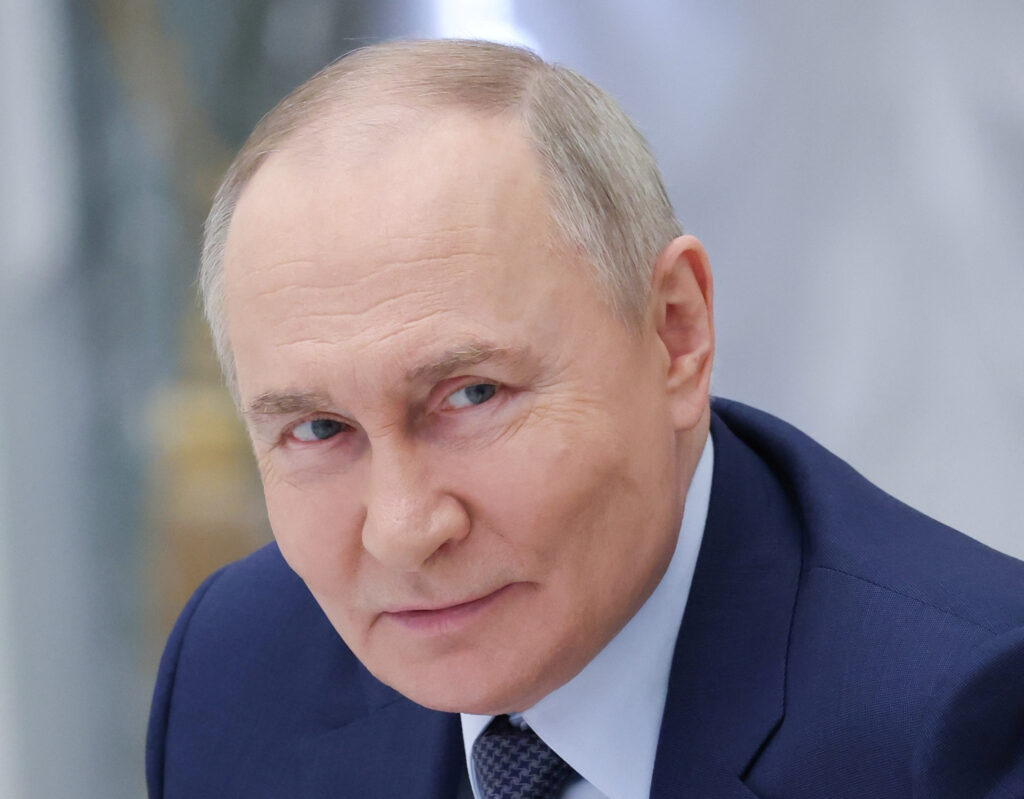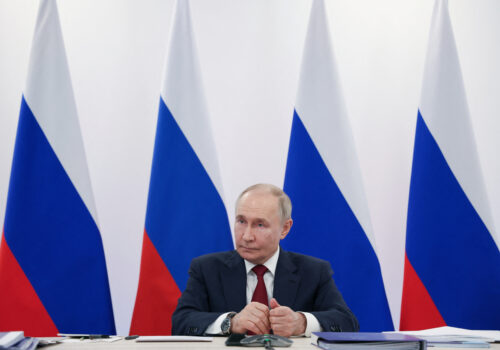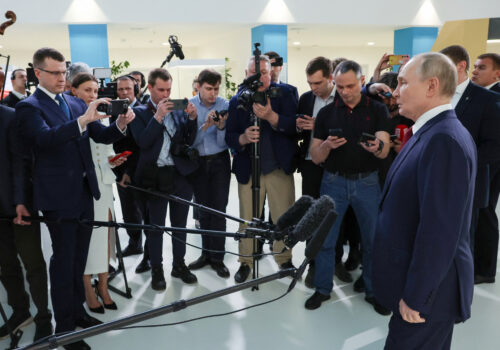This is part of a series of regular assessments of the efforts, spearheaded by the Trump administration, to achieve a negotiated end to Russia’s war on Ukraine. Read previous entries here and here.
What’s new?
On May 25, US President Donald Trump issued a blistering criticism of Russia’s massive and dayslong bombardment of Kyiv, Odesa, and other Ukrainian cities. Trump’s language was blunt and directed squarely at Russian President Vladimir Putin. In an impromptu discussion with reporters, Trump said of Putin: “I’ve known him a long time, always gotten along with him, but he’s sending rockets into cities and killing people, and I don’t like it at all. We’re in the middle of talking and he’s sending rockets into Kyiv and other cities. I don’t like it at all.” He also spoke about imposing additional sanctions on Russia.
Trump followed up this statement with a strongly worded Truth Social post, in which he said that Putin “has gone absolutely CRAZY! . . . I’ve always said that he wants ALL of Ukraine, not just a piece of it, and maybe that’s proving to be right, but if he does, it will lead to the downfall of Russia!”
What does it mean?
These developments have led some observers to ask whether, after weeks of expressing frustration but ultimately accommodating Kremlin obstructionism, the Trump administration is about to take a tough stand. This was the strongest of several statements Trump has made against Putin over the past two months as it has become obvious, even to members of the administration who have sought to end support for Ukraine, that Putin has no interest in accepting Trump’s approach to achieving a negotiated end to the war. Trump made similar remarks in late April and early May, both suggesting that he would impose additional sanctions on Russia.
But there’s the rub. Trump’s criticism of Russian strikes on Ukrainian cities and Kremlin nay-saying in the peace talks has not led to new sanctions. And just last week, after his long phone call with Putin, who once more refused US terms for a cease-fire, Trump heralded the Kremlin call for continuing direct Russia-Ukraine talks. It is therefore no surprise that Putin doubled down with massive air strikes in Ukraine.
Putin no doubt takes solace that in the Truth Social post that labeled him “CRAZY,” Trump also slammed Ukrainian President Volodymyr Zelenskyy for “talking the way he does. Everything out of his mouth causes problems, I don’t like it, and it better stop.” At this point, Putin reads Trump, like other Western leaders since Russia’s 2008 war in Georgia, as unwilling to take strong action against aggression.
Is Putin right? Yes, Trump has vacillated over the past three months, treating Zelenskyy’s understandable public reservations about White House wavering more harshly than Putin’s active obstruction of US objectives. Trump has also taken substantial criticism from friendly editorial pages, such as the New York Post and the Wall Street Journal, as well as from at least some Republicans in Congress. On Monday, Republican Representative Don Bacon and Republican Senator Chuck Grassley both publicly called on Trump to take further action against Russia.
What to watch next
What’s more, momentum is building to move the Sanctioning Russia Act of 2025—introduced by Senator Lindsey Graham (R-SC) and Senator Richard Blumenthal (D-CT) and now cosponsored by eighty-one senators. According to well-connected Republicans, the White House saw value in the presentation of the bill in April as a way of subtly putting pressure on the Kremlin, but it did not want any movement toward passage at that time. In the wake of recent developments, I am hearing that the Trump administration is mulling giving Republican senators the option of voting their conscience. With more than eighty cosponsors, that means the bill would pass easily.
This step cannot be taken for granted, and it is a sign that Putin’s aggressive posture—which prompted even US Vice President JD Vance to remark earlier this month that Russia was asking for too much—may finally prompt Trump to take more vigorous action. Indeed, Putin continued his vicious air campaign on Monday night, prompting another Truth Social post on Tuesday where Trump focused only on Putin, saying that the Russian leader is “playing with fire.”
While it remains to be seen whether actions will follow from Trump’s tougher rhetoric, Zelenskyy could help himself and Ukraine by taking a page from Putin’s playbook and controlling his urge to criticize White House policy. Responding to Trump’s strong criticism of Russia’s belligerence, Putin called Trump overly emotional but still thanked him for his peace efforts. Even justified criticism of US policy by the Ukrainian president diverts Trump’s attention from the real problem.
John E. Herbst is the senior director of the Atlantic Council’s Eurasia Center and a former US ambassador to Ukraine.
Further reading
Wed, May 21, 2025
Europe is striking back at Russia’s shadow fleet. Here’s what to know about the latest EU and UK sanctions.
New Atlanticist By
This week, Brussels and London unveiled new sanctions against Russia and the fleet of oil tankers and other vessels covertly trading in Russian oil. Atlantic Council experts assess the moves.
Wed, May 21, 2025
Putin aims to destroy Ukraine and has zero interest in a compromise peace
UkraineAlert By Peter Dickinson
Russia’s ongoing campaign to destroy Ukraine as a state and as a nation is taking place in front of the watching world and makes a complete mockery of US-led efforts to broker some kind of compromise peace, writes Peter Dickinson.
Tue, May 20, 2025
Putin continues to thwart Trump’s goal of achieving a cease-fire
New Atlanticist By John E. Herbst
The US and Russian presidents held a two-hour call on May 19. But was any real movement made toward ending Russia's war in Ukraine?
Image: Russian President Vladimir Putin chairs a meeting of the supervisory board of the Russia - Land of Opportunity organisation in Moscow, Russia, May 27, 2025. Sputnik/Alexander Kazakov/Pool via REUTERS




